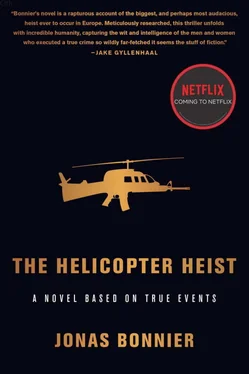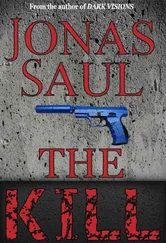And from a purely technical point of view, the job was simple.
“I want half the payment up front,” he said.
Petrovic nodded. “No problem.”
They shook hands. Petrovic swayed as he got to his feet.
“Christ, this is high,” he said, trying not to look down toward the water.
“It’s not you I’m flying, right?” Kluger said.
Petrovic laughed. “You get changed first,” he said. “I’ll wait till you’re done and gone.”
Kluger nodded and headed down the stairs in his white bathrobe. Petrovic allowed fifteen minutes to pass before he went to get dressed himself. On the way back to Upplandsgatan, to his police tail and bugs, he felt lighter than he had in a long while.
Michel Maloof had a pilot once more.
National Police Commissioner Therese Olsson was sitting in a big, beautifully decorated office with views out onto the park. As yet, there was still no sign of any red or yellow in the dense green treetops outside her window. She looked up from her desk as Thurn and Berggren came into the room.
“Caroline. Mats. Come in. Sit down. Lars is on his way.”
One of Olsson’s many qualities was her surprising capacity for remembering names. She was a politician, a careerist. At some point, Thurn thought, she must have been a good police officer. But that was a long time ago, and being a good boss was now enough.
It was down to Thurn’s initiative that Hertz would be involved in the meeting. The prosecutor may have been inexperienced, but he had shown a certain sharpness. Thurn knew that he wouldn’t show any initiative himself, but she was no longer afraid he would sabotage the operation.
While they waited for the prosecutor, they made small talk about the ambassadors, the brothel on Karlavägen and how the minister for foreign affairs would react when the time for prosecution finally came around. Hertz appeared ten minutes later, and breathlessly sat down on one of the chairs in front of the desk.
“Well,” said the police commissioner, “now I’m obviously curious what you have to say.”
Thurn concisely summed up what they had found out about Panaxia in Bromma. When she finished, the prosecutor made his first request, as Thurn had instructed him to do that morning.
“We would like to move the police helicopter from the base in Myttinge,” Hertz said.
“Move it?”
“It’s cheaper to move it than to increase our surveillance out there,” Mats Berggren explained.
He knew which arguments would be most effective.
“But do you really think—” Olsson began.
“The robbery is going to take place on the fifteenth,” said Thurn, “and we have information suggesting the robbers will try to destroy the only active helicopter in the Stockholm area. Why wouldn’t we move it?”
“And where should it go?”
“Our suggestion,” Hertz took over, “is that we leave it with the National Task Force in Sörentorp until further notice.”
It wasn’t a big decision, but the police commissioner had learned to gain points whenever she could. As a result, she looked hesitant at first, and jotted down a few words on a pad of paper on her desk. Then she nodded her approval.
“We had a similar thought,” she eventually said, studying Thurn thoughtfully. “I was planning to talk to you about the National Task Force.”
No one replied, despite the fact that Olsson had left a clear pause for them to say something.
“Yes, well,” she continued, “as you know, the preliminary investigation has, as of lunchtime, been upgraded to an extraordinary event.”
Berggren nodded.
“On my initiative,” Prosecutor Hertz pointed out, annoyed not to have been given credit. “It was my suggestion to upgrade it to an extraordinary event.”
Within the National Criminal Police, an “extraordinary event” meant that the case was now being given highest priority, with increased preparedness a result. An “extraordinary event” could be anything from the attempted murder of a high-ranking politician to an acute terror threat.
“And so,” Therese Olsson said, not paying any attention to the prosecutor’s territorial thinking, “we have come to the conclusion that we should call in the Task Force.”
A silence settled over the room. Thurn looked down at her hand, seemingly studying her nails. Mats Berggren had more difficulty being quite so subtle.
“What the hell do you mean by that?” he said. “Why bring in that pretend army to mess about in this? Don’t you think we can handle the situation?”
“It’s a decision we came to jointly,” the police commissioner said deliberately.
“Jointly?” asked Berggren.
“Within command,” Olsson clarified. “Even Carlbrink was involved.”
“Command?” asked Thurn. “Because that’s not good. The more who know about this, the greater the chance of leaks.”
“Are you suggesting that Carlbrink… that the head of the National Task Force can’t keep a secret?” Olsson snapped.
“I don’t mean anything other than that the more people who know, the greater the chance of leaks,” Caroline repeated.
She could no longer hide her irritation. She looked up, straight into the commissioner’s eyes.
“This is our case, Therese. We have it under control. Don’t you think we can manage without their army boots and rocket launchers? You’re our boss. Don’t you have any faith in your own staff?”
“Are we talking about the entire Task Force?” asked Berggren.
“Fully armed,” Olsson confirmed. “And with orders to shoot down a helicopter, if necessary.”
“This is a robbery we’re talking about,” Thurn pointed out. “It might be spectacular, possibly better planned than anything we’ve ever seen on Swedish soil. But it’s still just a robbery, not a coup. The police force has the resources to be able to handle this. We don’t need help from—”
“The Serbian police aren’t the only ones following this case,” Olsson interrupted. “Interpol is being updated continually. And the minister for foreign affairs has a personal interest in it too. If we let him down, then the minister for justice won’t have a leg to stand on when it comes to discussing resources at the next budget.”
Politics. There were few things that interested Caroline Thurn so little that could also make her quite so agitated. But she could see that this wasn’t a simple matter of police work, that it was about the ministers’ egos and the way the state distributed resources.
She got up.
“Fine,” she said. “So let the National Task Force handle it.”
The prosecutor got to his feet too. He nodded stiffly, and Thurn got the sense that somehow he had also been involved in the decision.
“We know where and when they’re going to strike,” said Berggren, who also got up from his chair with a labored groan. “By this stage, with everything handed to them on a silver plate, even the Task Force should be able to manage this.”
“They will be ready outside the Panaxia premises in Bromma from twenty-three hundred hours on the fourteenth of September,” Olsson replied. “But let us be clear about one thing. Until then, it’s you who are responsible.”
There was a balcony on the fifth floor.
Michel Maloof spotted it after his deathly boring visit to the Moderna Museet. He had parted ways with Alexandra Svensson outside the Grand Hotel and headed straight home to his drawings. He hadn’t given the fifth floor the same manic attention as the sixth, where Counting was located, but he spotted it among the drawings on the floor by his dining table. One sheet had been covering another, and when he pushed it to one side, there it was.
Читать дальше












